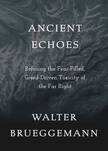Review: Walter Brueggemann on what the Bible really says about our political culture
Contemporary American religion and politics are linked in diverse ways, many of them problematic. Particularly prominent is the way in which evangelical Protestants and not a few Catholics support right-wing political positions—and do so on religious grounds. The highly respected Old Testament scholar Walter Brueggemann, professor emeritus at Columbia Theological Seminary, offers a critical assessment of that linkage in Ancient Echoes: Refusing the Fear-Filled, Greed-Driven Toxicity of the Far Right, a provocative set of essays that provides a useful treasury of biblical texts potentially relevant to contemporary political discussion.
Basing his argument on an analysis of right-wing politics put forth by Kurt Andersen in Evil Geniuses: The Unmaking of America: A Modern History, Brueggemann identifies eight propositions associated with that side of the political divide: (1) government is bad; (2) yesteryear was perfect, ideal; (3) establishment experts are wrong, science is suspect; (4) people are entitled to their own facts; (5) short-term profits are everything; (6) liberty equals selfishness; (7) inequality is not so bad; (8) universal health care is tyranny. Brueggemann offers eight responses, each of which is richly illustrated by biblical passages.
On many political issues, biblical passages may be relevant, but probably not decisive in determining political stands.
On defending the possibility of good governance, he notes that Ezekial 34:2-24 both criticizes Israel’s bad shepherds and promises proper care of the people by a truly good shepherd (34: 12-16). That vision is reinforced in Psalms 72:12-14 and in the actions of Jesus for those in need in Luke 7:22.
Appeals to an idealized past, often resembling MAGA mottos, can be found in Scripture in the admonition not to forget Jerusalem (Ps 137:5-6). However, these are outweighed by prophetic critiques of a present situation steeped in luxury, pride and exploitation (Am 6:4-6; Is 3:16-17; Jer 5:26-28) and are countered by portraits of a future that removes present suffering and inequality (Is 65:17-25).
In defense of medical science, frequently criticized during the Covid-19 pandemic, Brueggemann moves beyond the Hebrew Bible and appeals to Sirach 38:1-15, part of the Apocrypha (or “Deutero-canonical” texts). This passage, cited in full for those whose Bibles do not include it, appropriately calls its readers to honor physicians and pharmacists, whose skill explores the world that God has made.
Defense of learned doctors is straightforward, but Brueggemann’s challenge to the world of “alternative facts,” is more complicated. Here he deploys the story of Absalom’s coup against David (2 Sm 14-18), focusing on the counsel given Absalom by two advisors, Ahitophel and Hushai. The first offers a sensible but focused plan; the second a more extravagant plan, designed to fail, which is not surprising since Hushai was a clandestine supporter of David. The biblical story illustrates sets of “competing facts,” although the moral point that Brueggemann wants to score is not obvious. He recognizes that by citing a case of a failed prophet, Hananiah, an opponent of Jeremiah (Jer 28:11-14), whose optimistic vision of Israel’s future in the face of Babylonian imperialism proved incorrect.
Countering the profit motive, Brueggemann appeals again to a prophetic critique of scoundrels (Jer 5:26-29), but also to the Torah (Dt 16:19-20) and to the words of Jesus about the impossibility of serving both God and wealth (Mt 6:24).
Claims to self-sufficiency are found in Scripture on the lips of Pharaoh (Ez 29:3) and the king of Assyria (Is 37:24-25g) but countered by the words of Yahweh (Is 37:26-29; Ez 29:4-16). The warning of Jesus against greed and self-centeredness operates on a more personal scale (Lk 12:13-21).
Prophetic denunciations of inequality (Am 6:4-6) are juxtaposed with the situation of Israel in the desert, when all have what they need but no more (Ex 16). The egalitarian ideal did not last, but Moses warned against assumptions of self-sufficiency (Dt 8:12-17), as did Paul (2 Cor 8:15).
The defense of universal health care appeals to the example of Elisha’s healing of Naaman (2 Kgs 5) and Jesus’ care for all who needed healing (Mt 4:24; 9:35; 15:30-31), an example followed in the early church (Acts 5:16; 8:6-8; 28:8-9).
Brueggemann’s review of biblical texts relevant to contemporary political issues will no doubt delight left-leaning preachers and ordinary faithful, who will welcome the reminder that Scripture strongly defends the poor, the weak and the marginalized while condemning wealthy oppressors. Whether Bible-reading supporters of right-wing politicians will be totally convinced by the argument is doubtful.
Some may respond that their right-wing politics is not primarily about economics, or if it is, it is about responsible use of government resources. They may also argue that they are concerned not about money but about the defense of unborn human life, or the preservation of the security of their neighbors against an unregulated influx of migrants, or the effort to keep America’s judiciary true to the original intent of our founding documents. One may disagree with their arguments, but to ignore them will not help to overcome our current sharp political divisions.
Brueggemann reminds us all that the biblical tradition is severely critical of much that characterizes the right-wing agenda.
The popularity among many Christians of right-wing politics, especially Trumpian MAGA-ism, is a distressing contemporary phenomenon. The process of analyzing and engaging it critically might well start with a reading of important biblical texts, but engagement needs to go further and address contentious issues.
If one does have a consistent ethic of life, whatever that means in detail, what public laws should govern individual decisions in a pluralistic society, and what emphasis should be given to that ethic within a larger political and social scene? If one is concerned about migration, how should one balance a concern for public safety with the moral responsibility to care for asylum seekers? If one worries about fiscal responsibility and imposing financial burdens on coming generations, what are appropriate limits of debt, and how should it be paid?
On each of these issues and many more as well, biblical passages may be relevant, but probably not decisive in determining political stands or formulating public policy.
Walter Brueggemann has provided a useful tool reminding us all that the biblical tradition is severely critical of much that characterizes the right-wing agenda. It might well provide some inspiration for homilies on the issues involved. But engaging our Christian friends, and often our relatives, in dialogue about their political positions will require a broader sense of what those positions are and a thoughtful analysis of the issues that they raise.
This article also appeared in print, under the headline “Biblical Mandates,” in the February 2024, issue.











